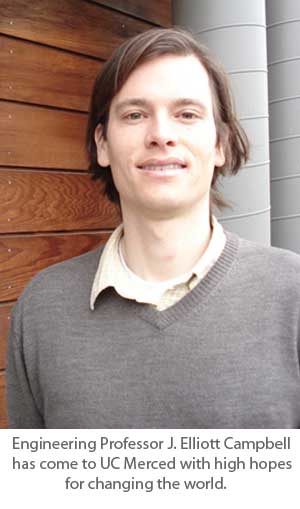

Professor J. Elliott Campbelland his new employer - UC Merced - have one big thing in common: They may be the rookies on the block, but they don’t let that keep them from making a global impact.
Campbell, a new assistant professor in the
School of Engineering, has already received nationwide attention for a recent study completed during his postdoctoral appointment at Stanford, concluding that the United States could meet up to 6 percent of its energy needs with biofuels produced on “marginal” ag land.
“It’s been suggested that biofuels production on prime agricultural land could accelerate global climate change,” Campbell explained. “We looked at what we call marginal land - for example, farmlands in the Eastern U.S. that were abandoned as the center of agriculture shifted west.”
His research has already been covered in more than a dozen national media outlets, including Science Daily, Nature Reports and the Christian Science Monitor.
Campbell hopes to make a big difference for the world in yet another way starting this fall at UC Merced.
While pursuing his education at Stanford, he became friends with Premal Shah, who went on to become president of the well-known nonprofit, global microfinance firm Kiva. He’ll leverage that connection to the benefit of UC Merced students in a two-semester Service Learning course this academic year.
His students will be exploring how to combine environmental science, computer science and financial and marketing know-how to create an index crop insurance system that Kiva may be able to offer to farmers in developing countries. This innovative insurance would depend on objectively reported environmental data - for example, precipitation information from weather stations - instead of traditional claims that are inefficient to implement and difficult to verify in remote, rural locations.
“Index crop insurance could allow farmers to survive the bad years, bounce back faster and ultimately improve crop yields,” Campbell said.
Perhaps the biggest bonus for students in the course: They’ll meet with Shah himself as early as the second week of the semester, using the dedicated Service Learning cars donated to UC Merced last year by
PG&Eto get to his San Francisco office.
Campbell said UC Merced seemed like a natural fit for his research and teaching plans.
“My role is focused on
sustainability,” he said. “I’ve been impressed by the faculty and staff at UC Merced; it seems like they all have an unusually high level of commitment to sustainability in their programs, and even physical structures, in a way that is not possible at established institutions.”
Campbell earned bachelor’s and Master’s degrees at Stanford, completed his doctorate at the University of Iowa, then returned to Stanford and the Carnegie Institution for a postdoc before joining the UC Merced faculty July 1.






